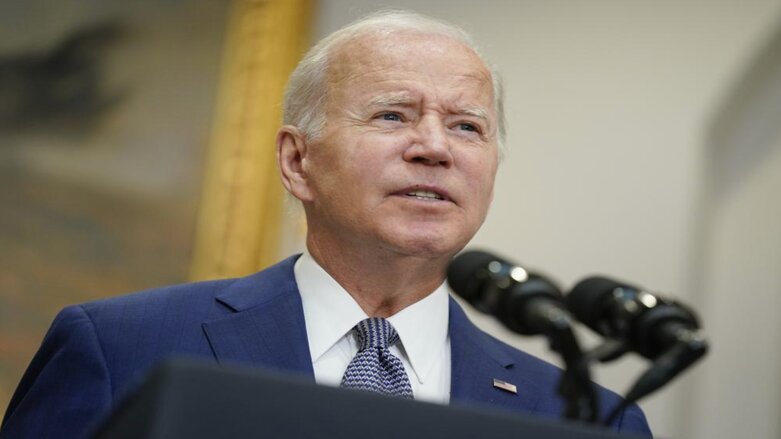Biden visit to Middle East begins Wednesday

WASHINGTON DC (Kurdistan 24) – US President Joe Biden will make his first trip to the Middle East as US president, starting on Wednesday, when he will arrive in Israel. He will hold meetings there, as well as in the West Bank, before traveling on to Jeddah, Saudi Arabia, where he will meet with the leaders of the Gulf Cooperation Council (GCC—Bahrain, Kuwait, Oman, Qatar, Saudi Arabia, the United Arab Emirates) plus Egypt, Iraq, and Jordan.
Iraqi Prime Minister Mustafa Al-Kadhimi will represent his country at the GCC+3 summit. The very limited size of the delegations will not allow for Kurdistan Regional Government (KRG) delegates to be included in the Iraqi delegation. However, if foreign ministers attend the meeting, Iraqi Foreign Minister Fuad Hussein will be there. Hussein is Kurdish and a Kurdistan Democratic Party (KDP) member.
Fixing US Policy: Focus on Arab-Israeli Coordination against Iranian Threats
As Biden's presidency began in January 2021, the renewal of the 2015 Iranian nuclear accord, formally known as the Joint Comprehensive Plan of Action (JCPOA), which former President Donald Trump left in 2018, was his administration's "signature Middle East initiative," as The Wall Street Journal described it on Monday.
The same figures, above all, Robert Malley, whose training is as a lawyer and who originally negotiated the JCPOA, were brought back under the Biden administration to revive the accord.
Quite ignored were the positions of America's traditional Middle East allies—like Israel and Saudi Arabia. They had opposed the accord when it was first concluded because they did not believe it would prevent Iran from acquiring a nuclear weapon.
Since Biden took office, there has been over a year of negotiations about reviving the JCPOA. But no agreement has been reached. Increasingly, the administration seems to accept that no nuclear deal is at hand, while its restraint in criticizing Iranian aggression was ill-advised.
Read More: US imposes new sanctions on Iran after failed JCPOA talks
Indeed, on Monday, National Security Council Advisor Jake Sullivan revealed an entirely new dimension to Iran's malign behavior: Tehran is preparing to send Russia a large number of drones, or Unmanned Aerial Vehicles (UAVs), including advanced UAVs, capable of firing missiles, for Russia's use in its war in Ukraine.
"Our information indicates that the Iranian government is preparing to provide Russia with up to several hundred UAVs, including weapons-capable UAVs on an expedited timeline," Sullivan told reporters. Iran will also be training Russian troops on how to use the UAVs.
For some time, various parties that have been attacked by Iran or its proxies, including the KRG, Saudi Arabia, and the UAE, have all complained to Washington about the Iranian assaults without getting the vigorous response they had hoped for. That may well change now.
Moreover, Sullivan's announcement, on the eve of Biden's visit to the Middle East, sets the stage for enhanced cooperation against Iranian threats.
Promoting Arab-Israeli Ties
At the same time, it is also evident that the greatest success in terms of Arab-Israeli diplomacy for the past 20 years is the Abraham Accords, which were concluded in the last year of the Trump administration. They are normalization agreements between Israel and three Arab states: Bahrain, the UAE, and Morocco.
The first two accords—Bahrain and UAE—are driven by shared concern over Iran's expansionism. Moreover, Saudi Arabia has considerable influence over Bahrain, and if Riyadh had opposed the pact, Bahrain, most probably, would not have concluded it.
Thus, Biden's visit to Israel will "focus on Israel's fast-strengthening ties with Arab countries and an emerging Arab-Israeli military partnership to combat threats from Iran," The New York Times reported.
"There is a new closeness between Israel and the Gulf," Itamar Rabinovich, a former professor of Middle East history at Tel Aviv University and Israel's ambassador to Washington from 1993 to 1996, told the Times, adding that the real question is whether the US can help to develop those ties further.
The Saudi Dimension
Biden's Middle East visit is also part of an effort to reset relations with Saudi Arabia in light of the economic crisis precipitated by Russia's invasion of Ukraine and the ensuing US-European embargo on purchases of Russian energy.
It "marks a move toward a more traditional US foreign policy with Saudi Arabia," The Wall Street Journal reported on Monday, "as the realities of oil diplomacy and geopolitics lead [Biden] to compromise on campaign promises to isolate the kingdom over human rights violations."
In a 2019 presidential campaign event, Biden declared his intent to make Saudi Arabia "pay the price and make them, in fact, the pariah that they are."
However, Russia's assault on Ukraine—the most serious conflict in Europe since World War II—has created an entirely new situation, and Biden has also come under criticism for his 2019 position.
Former Secretary of State Mike Pompeo told Fox News Monday that Biden's characterization of Saudi Arabia as a "pariah" state had been "an enormous mistake."
"There's only one country in that whole region that wants to threaten the United States of America and Israel and wipe us from the face of the earth," Pompeo said. "That's the leadership in Iran and the kingdom of Saudi Arabia's been an important partner in helping protect us from that threat."
